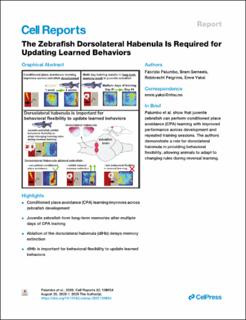Zebrafish dorsal habenula is required for updating learned behaviors
Peer reviewed, Journal article
Published version

Åpne
Permanent lenke
https://hdl.handle.net/11250/2683484Utgivelsesdato
2020Metadata
Vis full innførselSamlinger
Sammendrag
Operant learning requires multiple cognitive processes, such as learning, prediction of potential outcomes, and decision-making. It is less clear how interactions of these processes lead to the behavioral adaptations that allow animals to cope with a changing environment. We show that juvenile zebrafish can perform conditioned place avoidance learning, with improving performance across development. Ablation of the dorsolateral habenula (dlHb), a brain region involved in associative learning and prediction of outcomes, leads to an unexpected improvement in performance and delayed memory extinction. Interestingly, the control animals exhibit rapid adaptation to a changing learning rule, whereas dlHb-ablated animals fail to adapt. Altogether, our results show that the dlHb plays a central role in switching animals’ strategies while integrating new evidence with prior experience.
